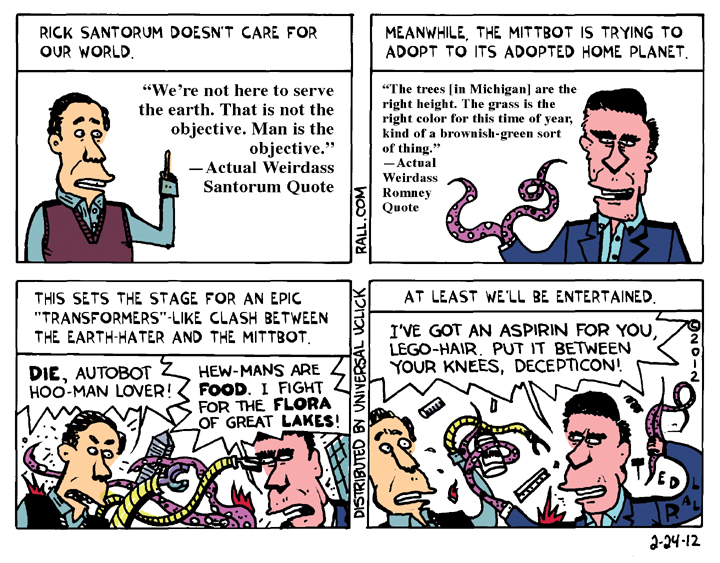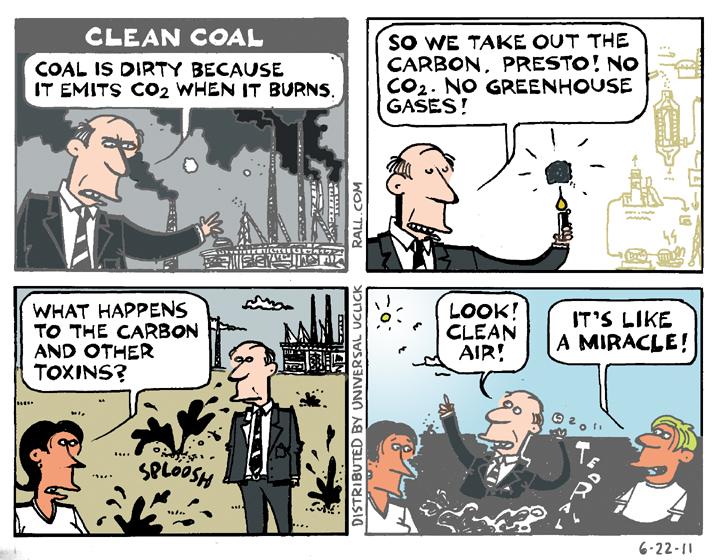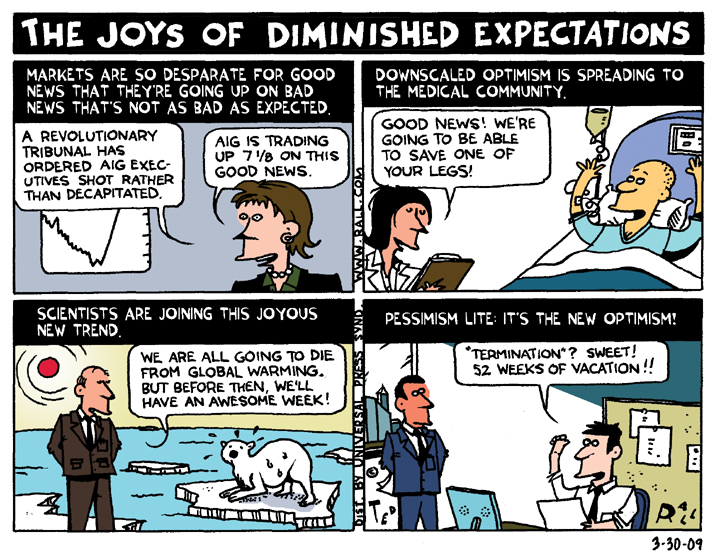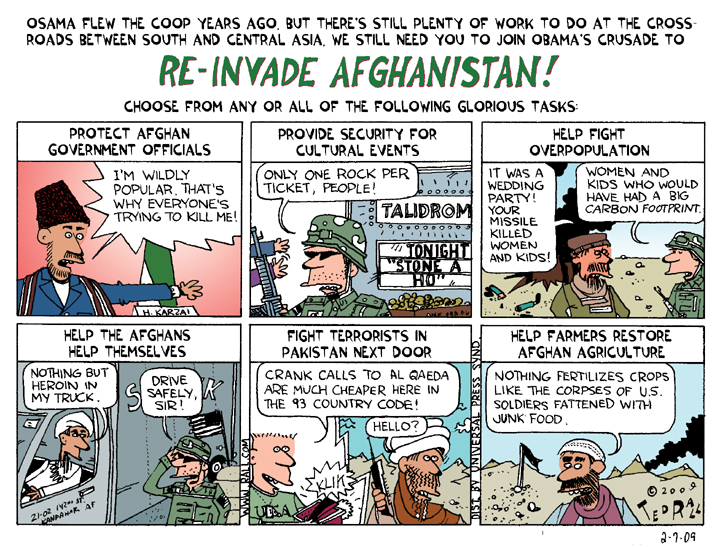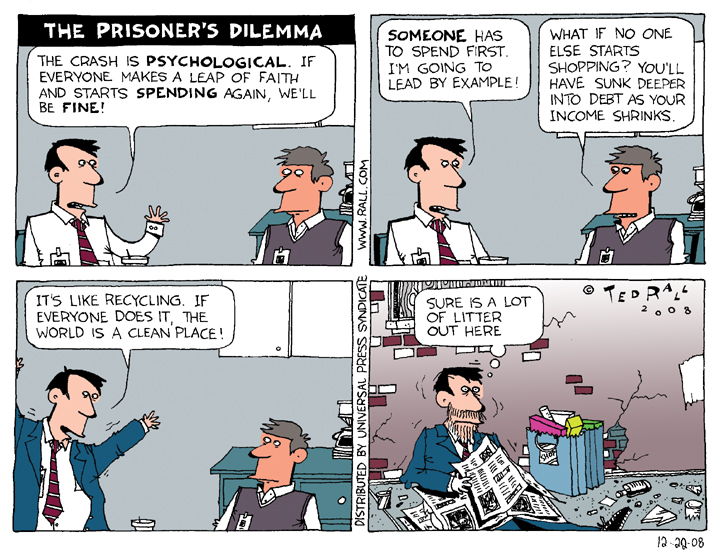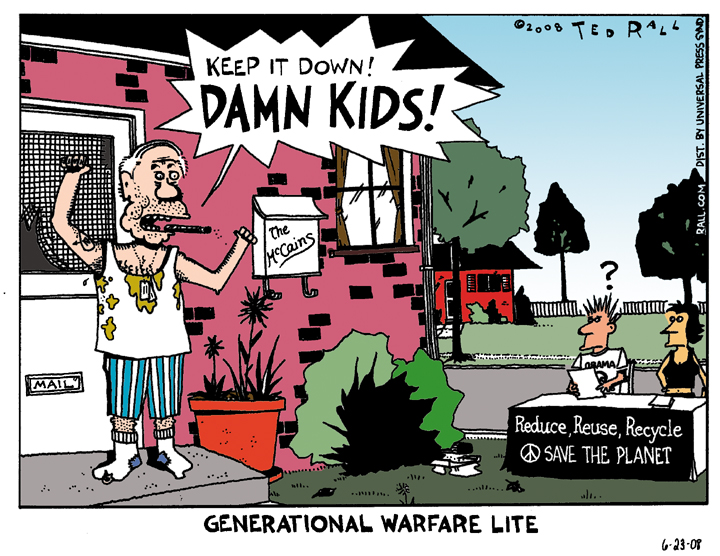Rick Santorum and Mitt Romney gear up for an epic clash about the fate of the planet. Also the presidency.
SYNDICATED COLUMN: Quit Whining About Student Loans
Time for #OWS to Broaden Its Appeal
It has been 30 days since Occupy Wall Street began. The movement hasn’t shaken the world à la John Reed—not yet—but at one thousand occupations and counting, it can’t be ignored.
OWS has become so impressive, so fast, that it’s easy to forget its half-assed origin. No matter. The fact that the French Revolution was partly set off by the drunken ravings of the Marquis de Sade hardly reduces its importance.
Soon the Occupiers will have to face down a number of practical challenges. Like weather. Winter is coming. Unless they move indoors, campers at Occupy Minneapolis and Occupy Chicago will suffer attrition. But indoor space is private property. So confrontation with the police seems inevitable.
As I saw at STM/Occupy DC, there is an ideological split between revolutionaries and reformists. Typical of the reformists: This week OWSers urged sympathizers to close their accounts with big banks like Citibank and Bank of America and move their savings to credit unions and local savings and loans. If revolutionaries get their way, there will be no banks. Or one, owned by the people.
There is no immediate rush, nor should there be, to issue demands. The horizontal democracy format of the Occupy movement’s General Assemblies is less about getting things done than giving voices to the voiceless. For most citizens, who have been shut out of politics by the fake two-party democracy and the corporate media, simply talking and being heard is an act of liberation. At some point down the road, however, the movement will come to a big ideological fork: do they try to fix the system? Or tear it down?
The Occupiers don’t have to choose between reformism and revolution right away—but they can’t wait too long. You can’t make coherent demands until you can frame them into a consistent narrative. What you ultimately want determines what you ask for in the time being—and how you ask for it.
Trotsky argued for the issuance of “transitional demands” in order to expose the uncompromising, unjust and oppressive nature of the regime. Once again, an “epoch of progressive capitalism” (reformism, the New Deal, Great Society, etc.) has ended in the United States and the West. Thus “every serious demand of the proletariat” de facto goes further than what the capitalist class and its bourgeois state can concede. Transitional demands would be a logical starting point for an Occupy movement with a long-term revolutionary strategy.
Both routes entail risk. If the Occupiers choose the bold path of revolution, they will alienate moderates and liberals. The state will become more repressive.
On the other hand, reformism is naïve. The system is plainly broken beyond repair. Trying to push for legislation and working with establishment progressives will inevitably lead to cooption, absorption by big-money Democrats and their liberal allies, and irrelevance. (Just like what happened to the Tea Party, a populist movement subsumed into the GOP.)
Revolution means violence in the streets. Reform means failure, and the continued, slow-grinding violence by the corporate state: poverty, repression, injustice.
At this point, job one for the movement is to grow.
I don’t mean more Facebook pages or adding more cities. The day-to-day occupations on the ground need to get bigger, fast. The bigger the occupations, the harder they will be for the police to dislodge with violent tactics.
More than 42 percent of Americans do not work. Not even part-time. Tens of millions of people, with free time and nothing better to do, are watching the news about the Occupy movement. They aren’t yet participating. The Occupiers must convince many of these non-participants to join them.
Why aren’t more unemployed, underemployed, uninsured and generally screwed-over Americans joining the Occupy movement? The Los Angeles Times quoted Jeff Yeargain, who watched “with apparent contempt” 500 members of Occupy Orange County marching in Irvine. “They just want something for nothing,” Yeargain said.
I’m not surprised some people feel that way. Americans have a strong independent streak. We value self-reliance.
Still, there is something the protesters can and must do. They should make it clear that they aren’t just fighting for themselves. That they are fighting for EVERYONE in “the 99 percent” who aren’t represented by the two major parties and their compliant media.
OWSers must broaden their appeal.
Many of the Occupiers are in their 20s. The media often quotes them complaining about their student loans. They’re right to be angry. Young people were told they couldn’t get a job without a college degree; they were told they couldn’t get a degree without going into debt. Now there are no jobs, yet they still have to pay. They can’t even get out of them by declaring bankruptcy. They were lied to.
But it’s not about them. It’s about us.
The big point is: Education is a basic right.
Here is an example of how OWSers could broaden their appeal on one issue. Rather than complain about their own student loans, they ought to demand that everyone who ever took out and repaid a student loan get a rebate. Because it’s not just Gen Y who got hosed by America’s for-profit system of higher education. So did Gen X and the Boomers.
No one will support a movement of the selfish and self-interested.
The Freedom Riders won nobility points because they were white people willing to risk murder to fight for black people. Occupiers: stop whining about the fact that you can’t find a job. Fight for everyone’s right to earn a living.
The Occupy movement will expand when it appeals to tens of millions of ordinary people sitting in homes for which they can’t pay the rent or the mortgage. People with no jobs. Occupy needs those men and women to look at the Occupiers on TV and think to themselves: “They’re fighting for ME. Unless I join them, they might fail.”
The most pressing issues for most Americans are (the lack of) jobs, the (crappy) economy and growing income inequality. The foreclosure and eviction crisis is also huge. OWS has addressed these issues. But OWS has not yet made the case to the folks watching on TV that they’re focused like a laser.
It takes time to create jobs. But the jobless need help now. The Occupy movement should demand immediate government payments to the un- and underemployed. All foreclosures are immoral; all of them ruin neighborhoods. The Occupy movement should demand that everyone—not just victims of illegal foreclosures—be allowed back into their former homes, or given new ones.
For the first time in 40 years, we have the chance to change everything. To end gangster capitalism. To jail the corporate and political criminals who have ruined our lives. To save what’s left of our planet.
The movement must grow.
Nothing matters more.
(Ted Rall is the author of “The Anti-American Manifesto.” His website is tedrall.com.)
COPYRIGHT 2011 TED RALL
Happy Earth Daze
posted by Susan Stark
This past week has been about the environment, coinciding with Earth Day on the 22nd. I was a little less than enthusiastic.
Unfortunately, like many holidays, this one has been compromised by those who oppose the very spirit the holiday is supposed to represent. Corporations used the event to trot out their “environmentally friendly” junk that people can whip out their credit cards for. And that includes the trotting out of ethanol and other supposedly friendly “biofuels” (never mind that biofuels cause increases in the price of food as arable land is used to grow gas). But the whole point of Earth Day is not to “buy” environmental products.
The whole point of environmentalism is to consume less. That is, to decrease your energy and material footprint on the planet, thus reducing global warming and the overconsumption of natural resources.
In the so-called developed world, especially in the US, this is not always easy to do. But it’s possible. You can start by doing this:
1) To decrease your energy footprint, make it a rule in your household that the last one leaving a room must turn off the lights and other appliances being used.
2) To decrease your energy footprint, install night-lights in the hallways so you can see without having to turn on the over-head lights. Night-lights use less energy.
3) To decrease your energy footprint, unplug ALL appliances in the household when they are not being directly used. All of them. Many appliances, such as a stereo or cable/satellite box, use energy even when not turned on.
4) To decrease your energy footprint, find out if there are any public transportation facilities where you live (train or bus), and use them as much as possible. Even out in the country, there may be a county bus system you can use.
5) To decrease your energy footprint, use a scooter, bicycle, moped, or your own two feet to get around instead of lazily using the car to go to the corner store or anywhere else nearby.
6) If you have a gas-guzzling automobile, go online or check around to see if you can have your vehicle modified so that it uses less gas per mile. Needless to say, this will decrease your energy footprint dramatically.
7) To decrease your energy footprint in the summertime, use a fan instead of air-conditioning. A fan uses less energy than the other. Also, take cool showers instead of hot showers. Not only do cool showers keep you cool, they also use less energy than hot showers. And, if it is REALLY HOT, take a t-shirt, run it under cold water, wring out the excess water, and put it on. This will keep you cool for hours. You can also wet your hair to keep you cool.
8) To decrease your energy footprint in winter, shut down the heat when there will be no one in the house or apartment. If you worry about pipes freezing, see what you can do to prevent this. If you want plants in the household that don’t die without heat, get plants like small cedars or spruce trees or any other type of evergreen plant. When there are people in the house or apartment, bundle up as much as possible and keep the heat on low. To keep cold air outside and warm air inside, put duct tape or weather stripping on the cracks of your windows and on the doors that you don’t use very often.
Reducing Waste:
1) If there is any item in your possession that you have no use for anymore, but can still be used by someone else, do not throw it away. Either give it or sell it to someone you know who wants or needs it, such as a friend, co-worker, family member, or neighbor.
2) There is website you can go to that can help you reduce waste:
http://www.craigslist.org/about/sites.html
At this site, you can post one or more items that you are either selling or giving away. You can also obtain items that others are selling or giving away. Here is another extemely useful website you can use:
At Freecycle, you can give or obtain items, but only for free. Hence the name “Freecycle”.
3) You can do the traditional method of decreasing waste, and that is to give items to your local charitable organizations (Salvation Army, Goodwill, etc.).
4) If you have electronic appliances that no longer work, you can recycle these:
http://www.epa.gov/epaoswer/hazwaste/recycle/ecycling/donate.htm
You can also do a google search on where you take e-waste to in your local area.
5) Finally, when you buy anything, try to buy it used. As much as possible.
6) And most finally, when considering buying an item (like a video game) or a service (like cable tv) of any kind, ask yourself, do I really need this crap?
THIS WEEK’S SYNDICATED COLUMN: ECO-TERRORISM? THERE’S NO SUCH THING
Property Rights Extremists Equate McMansions to 9/11 Victims
The United States should not build housing. Whole neighborhoods in places like Chicago and Dayton and Oakland and Newark and Memphis are dominated by abandoned houses and apartment buildings. Ten percent of our national housing stock–more than 13 million homes, enough to put roofs over the homeless three times over–are vacant year-round. So why do we let developers bulldoze fields and forests to put up soulless monstrosities?
Several “model houses” at a development bearing the typically atrocious name of “Quinn’s Crossing at Yarrowbay Communities” at the edge of Seattle’s creeping suburban sprawl went up in flames, apparently torched by radical environmentalists. I had two reactions. First, I was reminded of my wonder that such things happen so infrequently.
Then I laughed. I wasn’t alone. Time magazine bemoaned “a notable lack of sympathy for the fate of the homes” among residents of Washington state.
Quinn’s Crossing, says its website, was “dedicated to the ethos of putting the earth first.” In this case, putting Mother Earth “first” led the developers to construct “energy efficient” 4,500-square-feet McMansions. “The houses are out in the middle of nowhere, on land that used to be occupied by beaver dams and environmentally sensitive wetlands; the site sits at the headwaters of Bear Creek, where endangered chinook salmon spawn,” reported Erica C. Barnett for the Seattle weekly newspaper The Stranger. “The houses, and their polluting septic systems, also sit atop an aquifer, which provides drinking water for the area’s Cross Valley Water District.”
4,500 square feet? My last Manhattan apartment had 725. Visitors (New Yorkers, most of whom live in even tighter quarters) cooed over how big it was. The house in which I grew up had 1,000; it was designed for a nuclear family of four.
What galled ELF was the developers’ attempt to pass off self-indulgent, gargantuan McMansions as ecologically friendly. “The builders heavily promoted the ‘built green’ concept and pointed out that the homes were smaller than the 10,000-square-foot houses on previous Street of Dreams tours,” reported The Los Angeles Times.
Barnett’s story asked: “Were the Terrorists Right?” She noted: “An energy-efficient mansion will never use less energy than even a large urban apartment.”
Right or wrong, they’re not terrorists.
The feds say they are. They call Earth Liberation Front, the loose-knit “group” that took responsibility for the blazes in unincorporated Snohomish County, the biggest threat to mom, freedom, apple pie and three-minute pop songs since the Soviet Union closed shop. Six months before 9/11, shortly before the famous “Bin Laden Wants to Kick Our Ass Six Ways to Sunday” memo, the FBI went so far as to list the ELF as a federally designated terrorist organization. Like Al Qaeda.
Terrorism–you can look it up–involves killing people. Hijacking a plane and flying it into a building is terrorism. Destroying property–property that, for the most part, made the world a worse place–is not.
ELF’s goal of “inflict[ing] maximum economic damage on those profiting from the destruction and exploitation of the natural environment” has inspired people to set fire to SUVs at a New Mexico car dealership, Hummers in California, and a Vail ski lodge whose construction threatened the lynx, an endangered species. Damage to the Colorado ski project amounted to $12 million.
ELF members are vandals. They’re arsonists. But they aren’t terrorists.
ELF demands that its adherents “take all necessary precautions against harming any animal–human and non-human.” Although it could happen someday, no one has ever been killed or hurt in an ELF action. Equating the burning of a Hummer to blowing up a child exposes our society’s grotesque overemphasis on the “right” of property owners to do whatever they want. The word “eco-terrorism” is an insult to the human victims of real terrorism, including those of 9/11.
The closest ELF’s critics come to landing a punch is pointing out that fires send crud into the atmosphere. “This is releasing more carbon into the air than they ever would have by building the houses,” the listing agent for one of the destroyed “rural cluster development” houses told The New York Times. Newsweek asked: “If their cause is to save the environment, how does burning houses, and thereby releasing carbon and toxins into the atmosphere, help achieve that goal?”
Eye-roll alert: A house fire releases air pollution once. A family living in a house does it day after day for decades. Anyway, why are builders making houses out of toxins?
Property rights extremists raised the same point after ELF set fire to 20 Hummer H2s at a California car dealership in 2004. “There’s a lot more pollutants from the fire than the vehicles would pollute during their lifetime,” said the West Covina fire marshal. Even if that were true, he forgot where those gas guzzlers would have eventually ended up: in landfills, their nasty chemicals seeping into the ground.
“Think of all the resources those fires wasted,” moaned Seattle Times columnist Jerry Large. He explained that lawful means–petitions, politely worded letters to the editor, speaking at public hearings–are the proper way to take a stand against the destruction of the environment. “The development where this latest arson took place, situated atop the area’s water supply, has been challenged by other groups, using negotiation and the law,” he says approvingly. That’s true. The local zoning board heard from hundreds of opponents of Quinn’s Crossing before voting, 4 to 1, in favor.
Challenged, yes. But not successfully.
COPYRIGHT 2008 TED RALL

